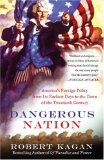Summary | Excerpt | Reviews | Beyond the Book | Readalikes | Genres & Themes | Author Bio
America's Place in the World from Its Earliest Days to the Dawn of the Twentieth Century
by Robert Kagan

Critics' Opinion:
Readers' Opinion:
First Published:
Oct 2006, 544 pages
Paperback:
Nov 2007, 544 pages
 Book Reviewed by:
Book Reviewed by:
BookBrowse Review Team
Buy This Book
Chapter 1
The First Imperialists
This is a commonwealth of the fabric that hath an open ear, and a public concernment. She is not made for herself only, but given as a magistrate of God unto mankind, for the vindication of common right and the law of nature. Wherefore saith Cicero of the . . . Romans, Nos magis patronatum orbis terrarrum suscepimus quam imperium, we have rather undertaken the patronage than the empire of the world. —James Harrington, The Commonwealth of Oceana, 1656
The Myth of the “City upon a Hill”: The Americanization of the Puritan Mission
Misperceptions about the history, traditions, and nature of American foreign policy begin with the popular image of the Puritans who settled in New England in the 1630s. John Winthrop’s hopeful description of the Massachusetts Bay theocracy as a “city upon a hill” is emblazoned in the American self-image, a vivid symbol of what are widely seen as dominant isolationist and “exceptionalist” tendencies in American foreign policy. The Puritan “mission,” as the historian Frederick Merk once put it, was “to redeem the Old World by high example,” and generations of Americans have considered this “exemplarist” purpose the country’s original mission in its pure, uncorrupted form: the desire to set an example to the world, but from a safe distance. Felix Gilbert argued that the unique combination of idealism and isolationism in American thought derived from the Puritans’ “utopian” aspirations, which required “separation” from Europe and the severing of “ties which might spread the diseases of Europe to America.” The true American “mission,” therefore, was inherently isolationist, passive, and restrained; it was, as Merk put it, both “idealistic” and “self-denying . . . a force that fought to curb expansionism of the aggressive variety.”
This picture of Puritan America as a pious Greta Garbo, wanting only to be left alone in her self-contained world, is misleading. For one thing, Winthrop’s Puritans were not isolationists. They were global revolutionaries. They escaped persecution in the Old World to establish the ideal religious commonwealth in America, their “new Jerusalem.” But unlike the biblical Jews, they looked forward to the day, they hoped not far off, when they might return to a reformed Egypt. Far from seeking permanent separation from the Old World, the Puritans’ “errand into the wilderness” aimed to establish a base from which to launch a counteroffensive across the Atlantic. Their special covenant with God was not tied to the soil of the North American continent. America was not the Puritans’ promised land but a temporary refuge. God had “peopled New England in order that the reformation of England and Scotland may be hastened.” As the great scholar of Puritan thought Perry Miller explained many years ago, the Puritan migration “was no retreat from Europe: it was a flank attack.” The “large unspoken assumption in the errand of 1630” was that success in New England would mean a return to old England.
The Massachusetts Bay colonists neither sought isolation from the Old World nor considered themselves isolated. The Puritan leaders did not even believe they were establishing a “new” world distinct from the old. In their minds New England and Old England were the same world, spiritually if not geographically. A hundred years after Winthrop’s settlement, when the Puritan evangelist Jonathan Edwards spoke of “our nation,” he meant both Britain and the British North American colonies. It was a measure of how little the New England Puritans sought isolation from the Old World that their greatest disappointment came when England’s Puritan revolution in the mid-seventeenth century abandoned rigid Calvinism, the Puritans’ model, thus leaving the Puritans theologically isolated in their American wilderness.
Excerpted from Dangerous Nation by Robert Kagan Copyright © 2006 by Robert Kagan. Excerpted by permission of Knopf, a division of Random House, Inc. All rights reserved. No part of this excerpt may be reproduced or reprinted without permission in writing from the publisher.





The Flower Sisters
by Michelle Collins Anderson
From the new Fannie Flagg of the Ozarks, a richly-woven story of family, forgiveness, and reinvention.

The House on Biscayne Bay
by Chanel Cleeton
As death stalks a gothic mansion in Miami, the lives of two women intertwine as the past and present collide.

The Funeral Cryer by Wenyan Lu
Debut novelist Wenyan Lu brings us this witty yet profound story about one woman's midlife reawakening in contemporary rural China.
Your guide toexceptional books
BookBrowse seeks out and recommends the best in contemporary fiction and nonfiction—books that not only engage and entertain but also deepen our understanding of ourselves and the world around us.